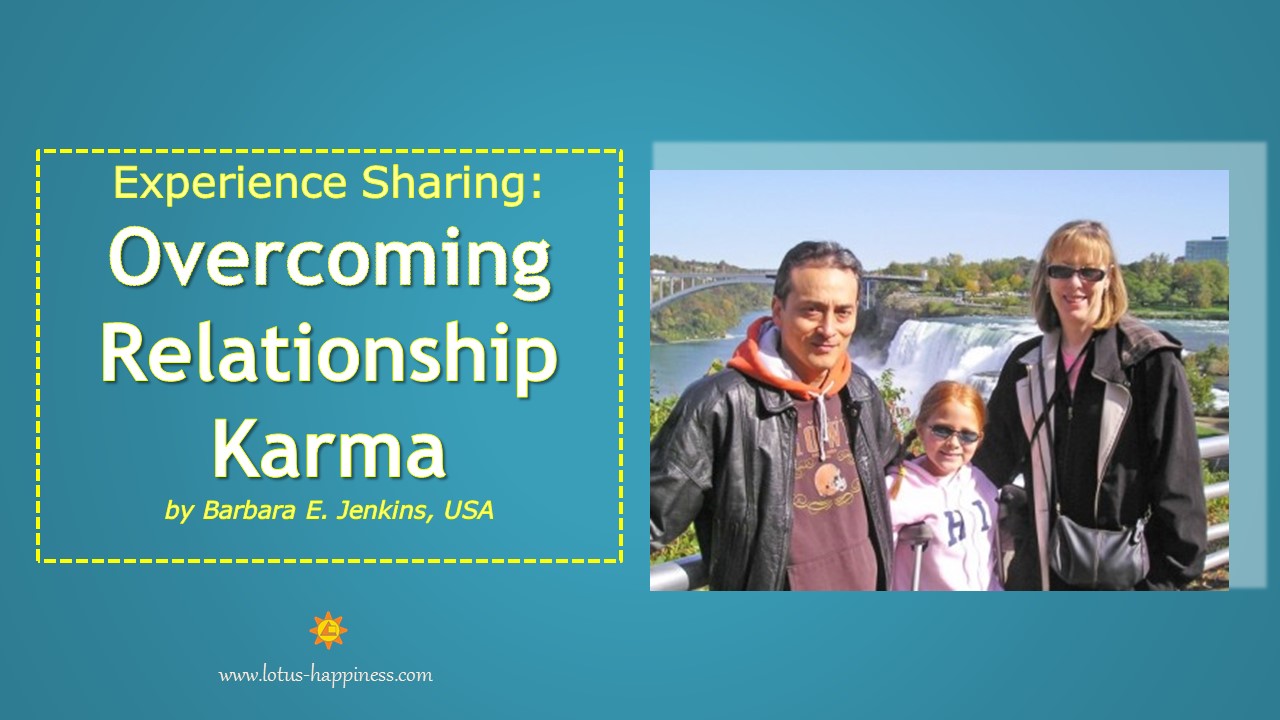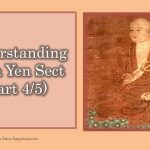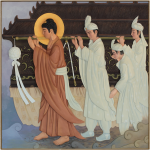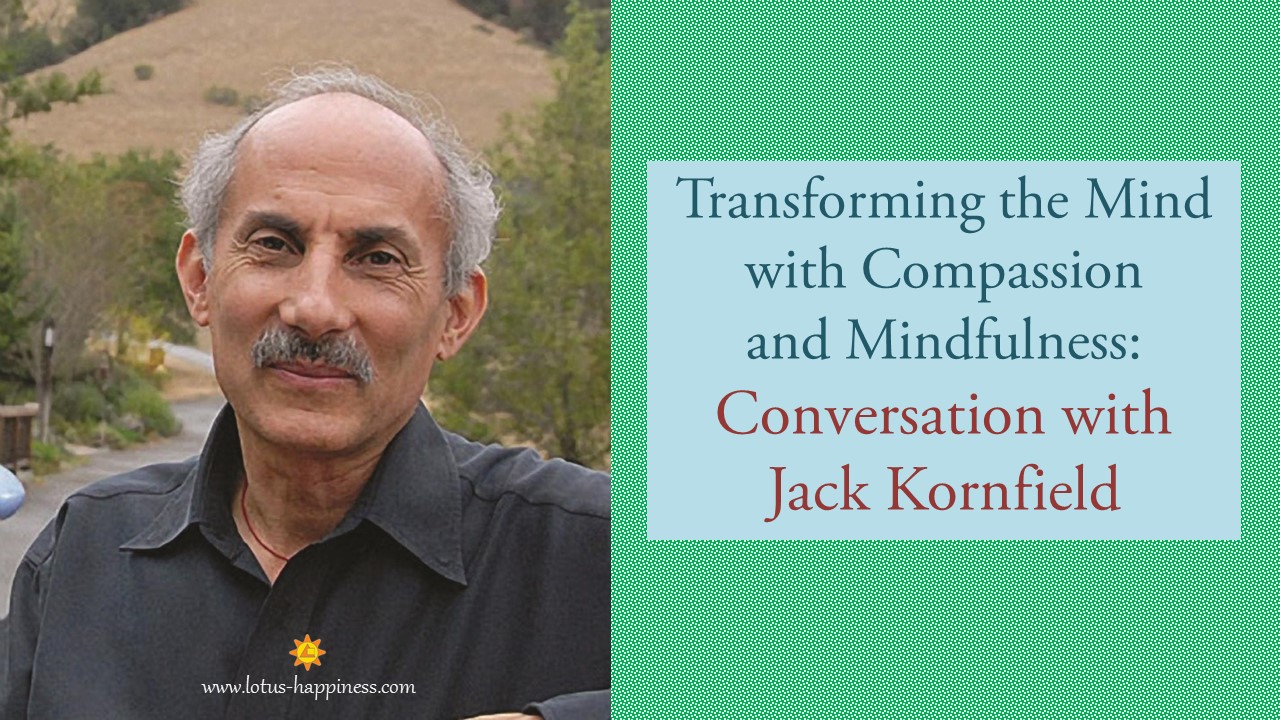Overcoming Relationship Karma
by Barbara E. Jenkins, USA
A few years after I began practicing Nichiren Buddhism, I met a young man with whom I fell in love. David was going to a university in Cleveland, studying to become an engineer. I taught him about chanting Nam-myoho-renge-kyo, and we participated in many SGI-USA activities together. He also was very supportive of my role as a young women’s leader, which required that I participate in a lot of meetings and sometimes travel out of town.
Shortly after we were married in 1978, David seemed to change. He came home one day and said that he wanted to be a painter. At first, I thought that meant he wanted to become an artist, but actually he had decided to quit school and paint houses. David soon left the painting job to become the road manager for a successful local rock band. His lifestyle changed drastically, and he began abusing alcohol and drugs.
Gradually, David began to oppose my practice, first in subtle ways (being angry when I came home from meetings) and then more obviously. Eventually David was against anything about the practice. He withheld all support, especially financial, and never contributed to our household from his work with the band. He refused to let me use our only car to attend meetings, which required that I either ask for rides or take two buses to the SGI-USA community center. One day I came home and there was a gun on my Buddhist altar. David never hurt me physically, but I started to keep my shoes next to the front door with my keys in them, just in case.
Financial Struggle
David ran up a $300 telephone bill, which he refused to pay. Consequently, for a year I was a youth leader without a telephone. I can still remember my nightly walks to the corner phone booth with a pocketful of spare change to call the SGI-USA members who I was supporting in faith. It was hard to maintain a cheerful spirit and encourage them when I was deeply suffering. But I was determined never to let the lack of a telephone prevent me from taking care of members.
The sole focus of my chanting Nam-myoho-renge-kyo at that time was survival. I believed David was the problem, so I chanted for him to change. But I also chanted to be strong enough to face the state of our lives. In addition to being without a phone, we hardly had money for food. In many ways, I felt protected as I continued to carry out my leadership responsibilities during this time. As a member of Byakuren (a young women’s group that helps SGI meetings run smoothly), I greeted fellow SGI-USA members arriving for activities at the Chicago and Cleveland community centers. Although I felt so ashamed about my personal situation that I would have preferred to clean the bathrooms rather than smile, I realize now that those efforts to encourage and welcome people allowed me to break through the darkness within my own heart. At the end of every meeting, I left in high spirits.
One year, I determined to attend a young women’s conference in Los Angeles and told David of my plans. Because of our financial situation, he said I could not go. I chanted with the clear goal of raising $500 in order to cover the travel expenses; I typed papers for students; pawned my jewelry, including my high school class ring; and even babysat. I succeeded in raising enough money to go but had only five dollars left to take care of my expenses in Los Angeles for one week!
The day of the trip, David agreed to drive me to the SGI-USA community center. Just before I got out of the car, he pulled a three-inch wad of money out of his pocket and fanned it in my face. “Have a good time,” he told me as he stuffed the money back in his pocket. It took every ounce of life force I had to walk in the door to face the awaiting young women, knowing that I had the responsibility to encourage them.
On the plane to Los Angeles, one of my seniors in faith found me crying. I felt humiliated as I shared my experience. But he encouraged me to hold my head up and be proud of my remaining five dollars.
“You have nothing to be ashamed of,” he told me. He said I was proving the validity of Nichiren Buddhism by facing my struggles. He even encouraged me to bring back change!
After the conference, I attended a dinner with SGI President Daisaku Ikeda. I felt defeated, as if I did not deserve to be there. During that dinner, President Ikeda told us to develop the type of fortune with which we could live off the interest in our savings accounts. My spirits were buoyed by his guidance, and when I returned home to Ohio, change from that five-dollar bill was still in my pocket.
To Leave or Not to Leave
The situation at home went from bad to worse. David’s drinking was out of control. He both sold and used drugs, and he crashed our car.
My leader, however, urged me to stop blaming my husband for my unhappiness.
Finally, I reached out to seek guidance from a senior in faith. I was miserable and determined to get a divorce. My leader, however, urged me to stop blaming my husband for my unhappiness. He said each negative encounter with David provided me with an opportunity to see my own life. David, he said, was my barometer of what I needed to change in myself. He encouraged me to chant to take 100 percent responsibility to change my karma, without blaming or holding a grudge against David.
He then related to me the story of an encounter between second Soka Gakkai president Josei Toda and a woman whose husband had violently opposed her practice. President Toda advised her: “If you can continue in your faith without yielding, no matter what the trouble facing you, you will thereby be able to change your karma and your husband will become a better man. Looking at your situation from a deeper point of faith, it could be likened to the interval between winter and spring, or nothing more than a changing of the tides from low to high. If your husband, however, should never change despite your devoted faith, he himself will opt to leave. Then you can divorce him.”
“Let me clarify my point. I am not saying that you should not divorce him. Nor am I saying you should do so. For you to prove the validity of this faith, I want you to sincerely do your best for one year, or at least six months, to shape the nucleus of your family revolution. Try to carry through the practice of faith valiantly for the sake of changing your misfortune for the better.”
President Toda went on to say: “Continue your faith with courage. I guarantee you with my whole life that things will change for the better.”
At first, this guidance made me very angry. I was ready to leave David now! But, reflecting on President Toda’s words, I came to see that I had to take on the challenge to overcome the karma at the root of my suffering. Otherwise, I would likely marry another man just like David. In fact, it was not the first time someone had opposed my practice. My parents, too, had been against my practice when I first started chanting.
Breaking the Chains of Karma
I chanted to become more compassionate and understanding. I increased my efforts to listen to and support the members that I was responsible for. Every time I wanted to complain about my home situation, I chanted three times instead. I chanted for David’s happiness, as well as my own. I was determined to overcome once and for all whatever tendencies in my life had caused me to live in this emotionally abusive environment. And I studied President Ikeda’s guidance for young people as if he were writing directly to me.
During this time, I developed the ability to chant no matter what was going on around me. I forged an unshakeable resolve that no one could ever take my Buddhahood from me.
I also learned the importance of not complaining. Complaining had previously consumed me. I had always blamed David for our circumstances. Chanting now with the determination to take 100 percent responsibility for my own happiness, I could see our circumstances from a different perspective and treat David with respect.
One year and one day after I challenged myself to follow the guidance I had received, David announced that he was moving out, and he agreed to an amicable divorce. This is exactly as Toda promised that woman, I thought.
Holding the Key to My Destiny
For four years, I was a happy, single woman. However, deep in my heart I wondered if I had really changed my karma. What if I married again and the same thing happened? How will I know if I changed my karma? I expressed this concern to one of my leaders and the answer was simple, “You’ll know.” I determined that I would show actual proof and have a happy relationship.
I learned that with a strong Buddhist practice, I hold the key to my destiny right in my hands.
In 1988, I married Mark Jenkins, who is my perfect life-partner. We share an extraordinary bond. Together we have been facing each of life’s hurdles—including our nine-year struggle to have a child—by continually strengthening our determination as we chant to the Gohonzon. Our daughter, Alissa, is 10 years old. We have been married for 19 years. I know now that because of all I went through with David, I have had the opportunity to change my life and create the future that I am now living. I appreciate David so much.
In 2007, David, who now lives in Virginia, called me. We spoke for the first time in 20 years. He apologized for everything that had happened between us, and I also apologized to him. He told me his mother had recently died, and because of his own health challenges he could not attend her funeral. I promised to go to his mother’s funeral and be his eyes and ears. After the service, I called and reported to him every detail I could think of—about the flowers he sent, how his mother looked, the people who attended. He was very appreciative. I felt nothing but warmth and compassion for his life. We ended our conversation with a commitment to get together the next time he came to town.
This experience taught me how to break through the heavy chains of my karma. Now, when I am faced with something difficult, I know that everything depends on my determination and practice. I have also learned to never give up on myself. It is not about whether one stays or goes; it is about whether one changes. I learned that with a strong Buddhist practice, I hold the key to my destiny right in my hands.
[Courtesy of Living Buddhism, SGI-USA, Jan–Feb 2008]
Source: SGI












